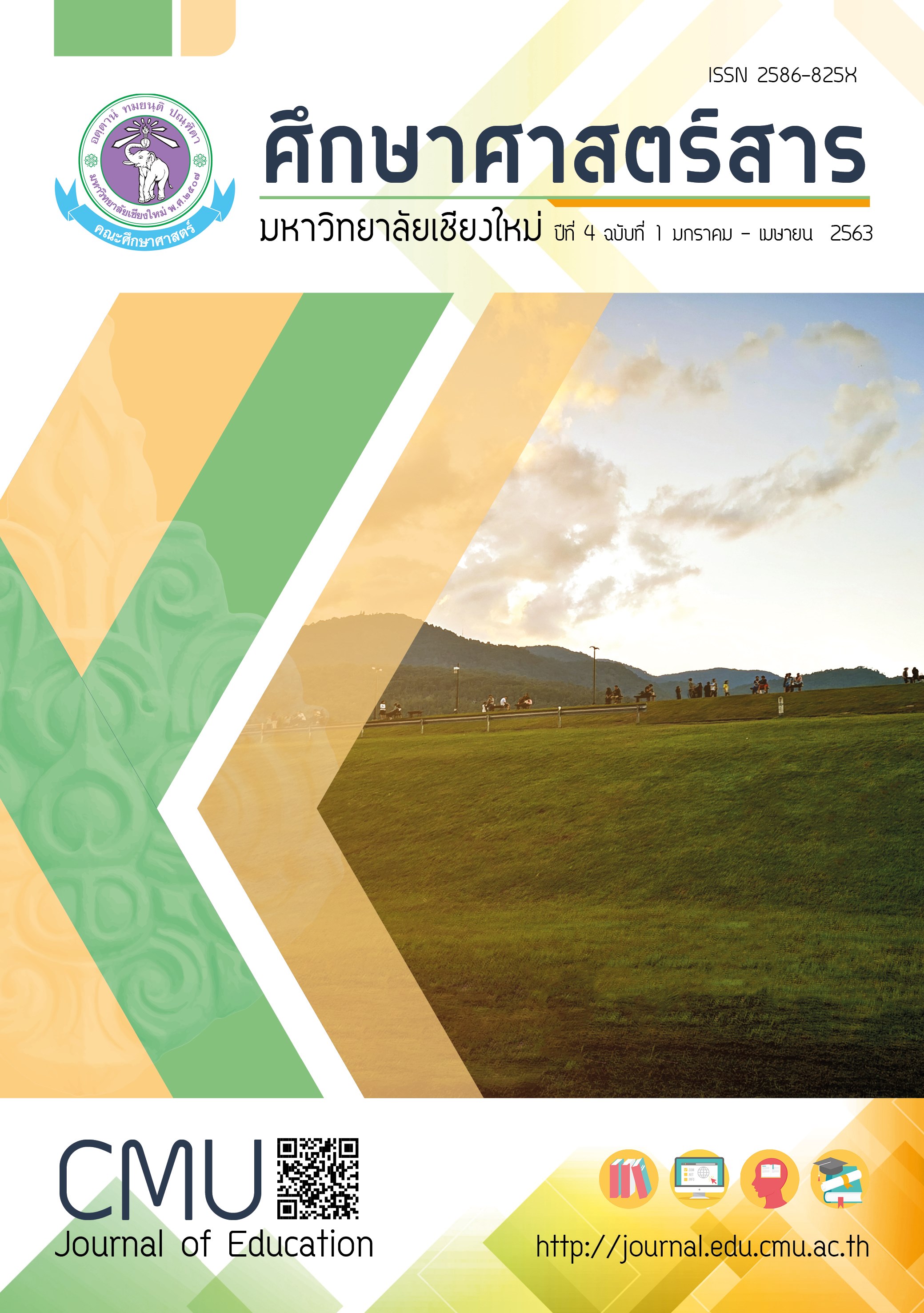ความเชื่อว่าด้วยความรู้ทางวิทยาศาสตร์ของนักเรียนมัธยมศึกษาตอนปลาย
Main Article Content
บทคัดย่อ
การศึกษานี้มีวัตถุประสงค์เพื่อศึกษาความเชื่อว่าด้วยความรู้ทางวิทยาศาสตร์ของนักเรียนชั้นมัธยมศึกษาตอนปลาย กลุ่มตัวอย่างเป็นนักเรียนจำนวน 291 คน จากโรงเรียนที่มีขนาดต่างกันในภาคตะวันออกเฉียงเหนือ เครื่องมือสำหรับเก็บรวบรวมข้อมูลเป็นแบบสอบถามความเชื่อว่าด้วยความรู้วิทยาศาสตร์ที่ถูกพัฒนาโดย Conley และคณะ (2004) จำนวน 26 ข้อ ซึ่งมีสี่มิติ ได้แก่ แหล่งความรู้ ความแน่นอนของความรู้ พัฒนาการของความรู้ และการอ้างเหตุผล ใช้สถิติ เชิงพรรณนา วิเคราะห์และนำเสนอผลการวิเคราะห์ในรูปค่าเฉลี่ยและส่วนเบี่ยงเบนมาตรฐาน ประกอบกับสถิติเชิงอนุมาน วิเคราะห์ความแตกต่างระหว่างเพศกับความเชื่อเกี่ยวกับความรู้และที่มาของความรู้โดยใช้การทดสอบ T ผลการศึกษาพบว่า นักเรียนมีความเชื่อในมิติการอ้างเหตุผลในระดับเชิงซ้อนมากกว่ามิติอื่น ๆ และไม่พบความแตกต่างระหว่างเพศในสามมิติได้แก่ แหล่งความรู้ ความแน่นอนของความรู้ และการอ้างเหตุผล ในมิติพัฒนาการของความรู้พบว่านักเรียนชายมีความเชื่อเชิงซ้อนสูงกว่านักเรียนหญิงอย่างมีนัยสำคัญทางสถิติ (p=.05)
Article Details

อนุญาตภายใต้เงื่อนไข Creative Commons Attribution-NonCommercial-NoDerivatives 4.0 International License.
หากผู้เสนอบทความมีความจำเป็นเร่งด่วนในการตีพิมพ์โปรดส่งลงตีพิมพ์ในวารสารฉบับอื่นแทน โดยกองบรรณาธิการจะไม่รับบทความหากผู้เสนอบทความไม่ปฏิบัติตามเงื่อนไขและขั้นตอนที่กำหนดอย่างเคร่งครัด ข้อมูลของเนื้อหาในบทความถือเป็นลิขสิทธิ์ของ Journal of Inclusive and Innovative Education คณะศึกษาศาสตร์ มหาวิทยาลัยเชียงใหม่
เอกสารอ้างอิง
กระทรวงศึกษาธิการ. (2551). หลักสูตรแกนกลางการศึกษาขั้นพื้นฐาน พุทธศักราช 2551.กรุงเทพฯ : โรงพิมพ์คุรุสภาลาดพร้าว.
ชาตรี ฝ่ายคำตา. (2551). การจัดการเรียนรู้ที่เน้นกระบวนการสืบเสาะหาความรู้.วารสารศึกษาศาสตร์ มหาวิทยาลัยนเรศวร, 11(1) ,33-45.
Abd–El–Khalick, F., & Lederman, N. G. (2000). Improving science teachers' conceptions ofnature of science: A critical review of the literature. International Journal of Science Education, 22(7), 665–701.
Baxter Magolda, M. B. (1992). Knowing and reasoning in college: Gender-related patterns in students' intellectual development. San Francisco: Jossey Bass.
Belenky, M., Clinchy, B., Goldberger, N. and Tarule, J. (1986). Women's ways of knowing: The development of self, voice, and mind. New York: Basic Books.
Chan, K. . (2007). Hong Kong Teacher Education Students’ Epistemological Beliefs and their relationships with conceptions of learning and learning strategies. The Asia-Pacific Education Researcher, 16, 199-214.
Conley, A. M., Pintrich, P. R., Vekiri, I., & Harrison, D. (2004). Changes inepistemological beliefs in elementary science students. ContemporaryEducational Psychology, 29, 184-204.
Duschl, R. (2008). Science education in 3 part harmony: Balancing conceptual, epistemic and social learning goals. Review of Research in Education, 32, 268-291.
Hofer, B. K., & Pintrich, P. R. (1997). The development of epistemological theories: Beliefs about knowledge and knowing and their relation to learning. Review of Educational Research, 67(1), 88-140.
Hotulainen, R & Telivuo , J. (2015). Epistemological Beliefs and Scientific Reasoning in Finnish Academic Upper Secondary Education. Kasvatus & Aika, 9(1) , 92-106.
Kelly, G. J., McDonald, S., & Wickman, P.-O. (2012). Science Learning and Epistemology. In B. J. Fraser, K. G. Tobin & C. J. McRobbie (Eds.). Second International Handbook of Science Education, 1, 281-291. Dordrecht: Springer.
King, P. M, & Kitchener, K. S. (1994). Developing reflective judgment: Understanding and promoting intellectual growth and critical thinking in adolescents and adults. San Francisco: Jossey-Bass.
Kudret Ozkal, Ceren Tekkaya, Semra Sungur, Jale Cakiroglu & Erdinc Cakiroglu. (2010).Elementary Students’ Scientific Epistemological Beliefs in Relation to Socio-Economic Status and Gender. Journal of Science Teacher Education, 21(7), 873-885.
Kuhn, D. (1991). The skills of argument. New York: Cambridge University Press.
Edmondson, K. M. and Novak, J. D. (1993), The interplay of scientific
epistemological views, learning strategies, and attitudes of college students.
Journal of Research in Science Teaching, 30(6), 547-559.
Nussbaum, E. Michael, Sinatra, Gale M. and Poliquin, Anne. (2008). Role of Epistemic
Beliefs and Scientific Argumentation in Science Learning.
International Journal of Science Education, 30(15), 1977-1999.
Özkal, K., Tekkaya, C., Sungur, S., Çakıroğlu, J. & Çakıroğlu, E. (2011). Elementary
students’ scientific epistemological beliefs in relation to socio-economic status
and gender. Journal of Science Teacher Education, 22(2), 115-127.
Peer, J. and Atputhasamy, L. (2005). Students’ epistemological beliefs
about science: The impact of school science experience. Journal of Science and Mathematics Education
in Southeast Asia, 28(2), 81-95.
Perry, W.G. (1970). Forms of intellectual and ethical development in the college years: A scheme.
New York: Holt, Rinehart and Winston.
Ryan, M. P. (1984). Monitoring text comprehension: Individual differences in epistemological standards.
Retrieved from https://files.eric.ed.gov/fulltext/ED233300.pdf.
Schommer, M. (1990). Effects of beliefs about the nature of knowledge on
comprehension. Journal of Educational Psychology, 82, 498-504.
in epistemological standards. Journal of Educational Psychology, 76, 248-258.
Schommer-Aikins, M. (2004). Explaining the epistemological belief system: Introducing the embedded
systemic model and coordinated research approach.Educational Psychologist, 39, 19-29.
Takayoshi, F., Piti, L., & Phillips, B. J. (2012). Thai University Students’ Scientific
Epistemic Beliefs: Relationships with Past Learning Experiences.
Procedia-Social and Behavioral Sciences, 69, 187-196.
Tsai, C.-C. (1999). The progression toward constructivist epistemological views
of science: A case study of the STS instruction of Taiwanese high school
female students. International Journal of Science Education, 21(11), 1201-1222.
Tsai, C.‐C. (2000). Relationships between student scientific epistemological beliefs
and perceptions of constructivist learning environments. Educational Research, 42, 193–205.
Tsai, C.-C., Ho, H.-N., Liang, J.-C., & Lin, H.-M. (2011). Scientific epistemic beliefs,
conceptions of learning science, and self-efficacy of learning science among
high school students. Learning and Instruction, 21, 757–769.
Weinstock, M. (2006). Psychological research and the epistemological approach to argumentation.
Informal Logic, 25(1), 3-20.
Yang F-Y. (2016). Learners’ Epistemic Beliefs and Their Relations with Science
Learning-Exploring the Cultural Differences. In: Chiu MH. (Eds.) Science
Education Research and Practices in Taiwan. Springer: Singapore.
Yang, F. Y., Chang, C. C., Chen, L. L., & Chen, Y. C. (2016). Exploring learners’ beliefs
about science reading and scientific epistemic beliefs, and their relations with
science text understanding. International Journal of Science Education, 38(10), 1591–1606.


